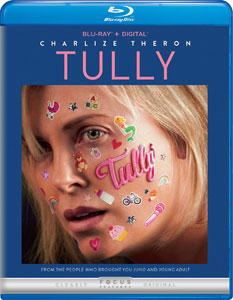From “Juno” (2008) to “Young Adult” (2011) to this year’s “Tully,” writer Diablo Cody – with Jason Reitman directing – has put together a spiritual trilogy of films about transitional periods in life, and they are always jarring. Juno is a teenager who is about to have a baby, Mavis is an adult who clings to her youth at the expense of everything else, and in “Tully” (now available for home viewing), Marlo is a mom who is exhausted from raising her three children.
Cody has developed a reputation as one of the elite female voices in film, but her heroines aren’t superheroes. In fact, their biggest flaw might be that they try and fail to do everything on their own, and this is most notable in “Tully.” This thoroughly watchable 95-minute riff starts by communicating to the audience the exhaustion of Marlo (Charlize Theron), who is about to have her third child.
Her oldest child, Jonah (Asher Miles Fallica), has a sensory condition that requires her to brush his skin nightly, so he’ll grow accustomed to touch. The behaviorally challenged Jonah needs a more specialized school, but Marlo and husband Drew (Ron Livingston) can’t afford it. So Marlo has several visits with the principal about how Jonah needs a “better fit,” which sounds to Marlo like “he needs to get the hell out of here.” And so the stress builds, manifesting in meals of frozen pizza and microwaved vegetables, and a house where the floor hasn’t been cleared of Legos in eight years.
Cody, Reitman and Theron weave a delicate path, making us feel for Marlo by portraying these evocative stresses. For a brief moment, I did think, “Well, if it’s so hard, you know you can stop having kids, right?” But then 26-year-old Tully (Mackenzie Davis), a night nanny hired by Marlo’s rich and sympathetic brother Craig (Mark Duplass), enters the picture and lightly chastises me for being harsh. Tully is immediately sweet to Marlo and her new baby, Mia. Tully recognizes the healing power of a full night’s sleep; after mere seconds of introductions, she instructs Marlo to go to bed. Tully will take care of Mia overnight, and by extension, take care of Marlo.
I realized Cody’s broad message: The gap between something being incredibly hard and being doable isn’t always as wide as we make it out to be. But how to bridge that gap? Is it help from a crucial person who acts as life’s missing puzzle piece, or simply telling yourself it can be done?
My review of “Tully” requires a SPOILER ALERT from this point forward.
The answer to the central question posed by Cody is: other people are crucial … and so is your inner voice. I think. By the end, after Marlo survives a drunken single-car wreck with only bumps and bruises, Drew – a good person, just oblivious to his wife’s needs (in other words, a guy) — realizes he needs to contribute more to the raising of their kids. Something clicks in Jonah, too, as he recognizes his mom as a human being, not as someone who exists to serve his every special need. The family’s second lease on building a healthy unit is certainly a happy ending.

But the second part of that answer – Marlo’s inner voice – gives “Tully” the weirdest message of any mainstream film in 2018. It turns out that Marlo never did accept Craig’s gift of a night nanny. Rather, she invented Tully in her head. The film drops hints that Tully is not real – from Drew not seeing the nanny to the broad fact that Tully behaves like a magical character rather than one of the earthy people Cody specializes in — so it plays fair with the twist, but the point of the film is nonetheless convoluted.
By making up this imaginary person, an idealized version of her younger self, Marlo gets healthier – and not just from her own point of view (which is skewed by the fact that she’s an unreliable narrator), but also that of the people around her. As Marlo sings karaoke with her daughter, Emmy (Maddie Dixon-Poirier), Drew and Craig notice she is refreshed thanks to the help of the night nanny. They are thrilled to have an alert and vibrant Marlo back.
After the revelation, how do we explain the refreshed Marlo? It can only be because she has come to a point of inner peace about where she is at in life. But we now know for a fact that she hasn’t been getting full nights of sleep; she has been getting up to take care of Mia. So in a nutshell: Marlo solves her mid-life crisis through extreme mental illness brought on by sleep deprivation.
To be fair, “Tully” does not recommend this path. After all, Marlo nearly dies in the drunken and sleep-deprived car crash. But I struggle with the message, and also the film’s portrayal of sleep deprivation. I know of no recorded case where a shortage of sleep helps a mind effectively work through problems. Rather, it seems the opposite would be the case: The less sleep you get, the more off-base your self-analysis would be. The pre-twist notion that a good listener and advice-giver can help a person work through their problems makes a lot more sense.
So “Tully” lands in an awkward position where the twist makes it more worthy of post-viewing discussion but it also alters the film from one that makes straightforward, logical sense to one that does not. However, I don’t want to be too hard on “Tully,” because it’s easy to watch and engrossing, and I suspect I may have overlooked something crucial that ties it all together.

